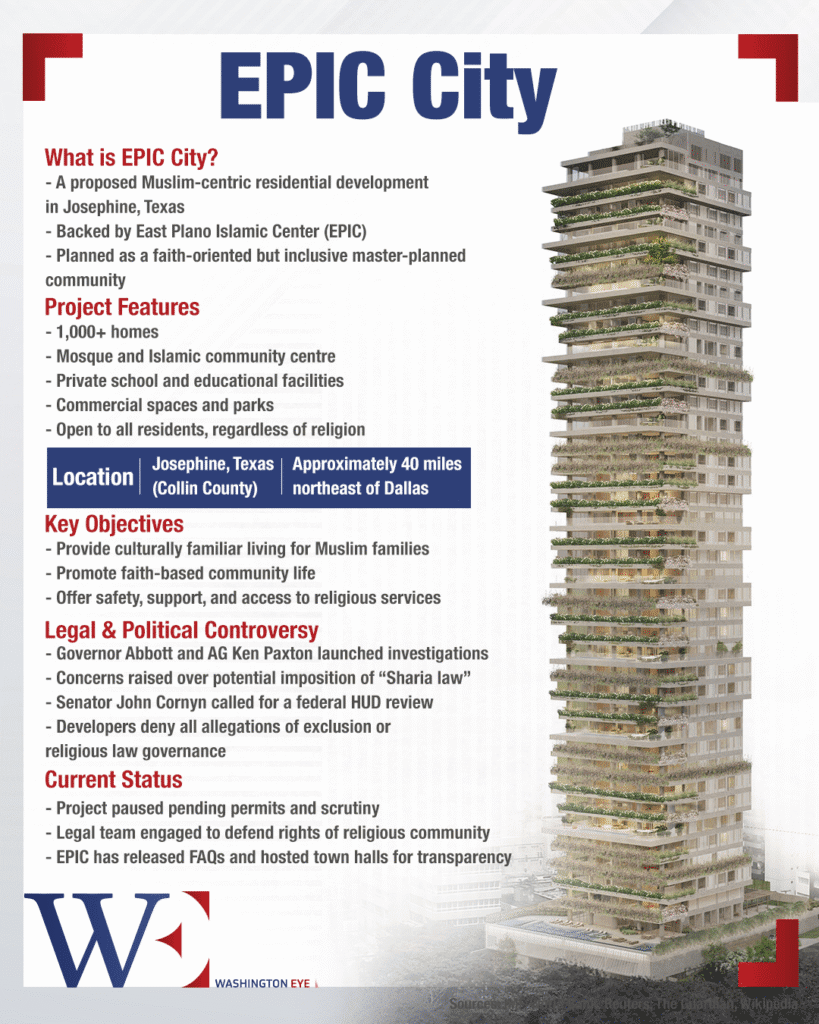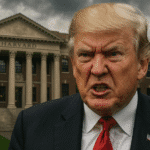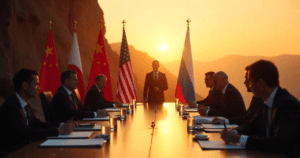by: The Washington Eye
In the quiet town of Josephine, Texas, a proposed residential development called EPIC City has sparked a nationwide debate about religious freedom, urban planning, and political overreach. The project—backed by the East Plano Islamic Center (EPIC)—aims to build a Muslim-centric community spanning over 1,000 homes, schools, commercial areas, and a mosque. While the developers have maintained that the community would be inclusive and open to all, a wave of political scrutiny has cast a shadow over what might otherwise be considered a routine housing development.
At the center of this controversy lies the question: where do the boundaries between religious freedom and local governance begin and end?
The Vision Behind EPIC City
According to project leaders, EPIC City is intended to provide a safe and culturally welcoming space for Muslim families in Texas—a community designed to meet their social, spiritual, and educational needs. The concept is not without precedent. Similar ethnically or religiously oriented neighborhoods exist across the United States, from Orthodox Jewish enclaves in New York to Amish communities in Pennsylvania.
Developers argue that EPIC City is about lifestyle choice, not segregation. The design is based on creating a strong community support network while remaining compliant with zoning regulations and open to all residents, regardless of faith or background.
Despite this, some state leaders have sounded alarms.
Political and Legal Scrutiny
In recent months, Texas Governor Greg Abbott and Attorney General Ken Paxton have launched investigations into the EPIC City initiative. Governor Abbott suggested that “no city in Texas should allow the establishment of a community governed by a different set of laws, including Sharia law.” Paxton, likewise, opened a civil investigation into the project, citing concerns over its religious nature.
At the federal level, Senator John Cornyn called for a U.S. Department of Housing and Urban Development (HUD) probe into whether any federal housing laws may be violated by a religiously themed neighborhood development.
These actions have ignited concern among civil liberties groups and legal experts who warn that the state’s scrutiny could amount to religious profiling. There is no evidence that EPIC City seeks to replace U.S. or Texas law with Sharia law, and such suggestions, critics argue, perpetuate dangerous stereotypes about Muslims.
Religious Freedom and the Constitution
The First Amendment of the U.S. Constitution guarantees the free exercise of religion. In the context of urban development, this means that religious organizations have the right to purchase land, build places of worship, and develop communities—so long as they comply with local regulations. The Religious Land Use and Institutionalized Persons Act (RLUIPA), enacted in 2000, further protects religious entities from discriminatory zoning laws.
Legal experts note that unless EPIC City violates specific zoning rules or environmental standards, targeting the project because of its religious affiliation could amount to a constitutional violation.
Omar Suleiman, a prominent Islamic scholar and civil rights advocate, said in a recent statement: “This is about the right of Muslims to live in peace and build communities, just like any other faith group in America.”
Community Reaction and Misinformation
Local responses to EPIC City have been mixed. While some residents have expressed concerns about infrastructure strain or the scale of the project, others have voiced outright hostility rooted in misinformation and Islamophobia. Social media posts and viral videos have falsely claimed that the city will be governed by Islamic law or that non-Muslims will be excluded—claims that EPIC leadership has categorically denied.
In an effort to combat false narratives, EPIC representatives have held town hall meetings, released public FAQs, and even hired high-profile legal counsel to ensure transparency and legal compliance.
Despite these efforts, the project remains under the microscope.
Urban Planning Through a Religious Lens
The controversy surrounding EPIC City raises a broader question: how should local governments and the public respond to religiously oriented urban developments?
The United States has a long tradition of religious communities carving out spaces that reflect their values—whether it’s Mennonite villages, Catholic parishes, or Buddhist retreat centers. In most cases, these communities coexist peacefully with their surroundings and contribute to the broader social fabric.
The key, urban planners argue, is inclusivity. Religious identity can be a foundation for community-building without becoming a mechanism for exclusion. If EPIC City follows zoning rules, complies with environmental regulations, and welcomes diverse residents, there should be no legal basis for opposition grounded purely in religious difference.
The Stakes Going Forward
If Texas authorities continue their probe based solely on EPIC’s religious affiliation, the case could escalate into a legal battle with national implications. At stake is not just the future of EPIC City, but the broader question of whether religious freedom can withstand the pressures of political rhetoric and cultural misunderstanding.
More than anything, the debate reflects the challenges of religious pluralism in 21st-century America. As Muslim communities grow in size and influence, their ability to shape local geographies—like any other group—will test the country’s commitment to the constitutional values it holds dear.
In the words of civil rights attorney Arif Panju, representing the developers, “This is a matter of principle. We are fighting to ensure that religious communities are treated equally under the law, without fear or prejudice.”
As the story of EPIC City unfolds, it may well become a defining case for religious liberty and urban development in modern America.















